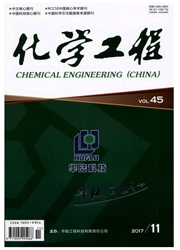

 中文摘要:
中文摘要:
分别以H2O(g)和CO2为气化剂,采用自制的煤炭地下气化模拟实验装置完成大颗粒鹤壁烟煤和晋城无烟煤的气化模拟实验,用便携式气体分析仪对煤气组分进行测定,并用SEM分析气化后的半焦,考察了气化剂种类、气化温度和气化时间对2种煤气化反应特性的影响。结果表明:CO2为气化剂时,反应温度越高,煤气中CO,H2,CH4含量越多,煤气热值也越高;以H2O(g)为气化剂时,H2含量随着反应温度升高增大,CO含量则先增大后降低,CH4明显降低。气化温度1 000℃时煤气热值最高,鹤壁煤和晋城煤热值分别达13.12 MJ/m~3和11.25 MJ/m~3;气化进行30 min时反应速率最大,60 min时热值最高;相同气化剂条件下鹤壁烟煤的煤气热值高于晋城无烟煤煤气;相同煤种条件下H2O(g)为气化剂时的煤气热值高于CO2。
 英文摘要:
英文摘要:
The model tests of large coal particle gasification of Hebi coal and Jincheng coal, with CO2 and steam as gasifying agents, were carried out by using self-made large coal particle gasification model test system. The components of coal gas produced were determined by applying the portable gas analyzer and gasification semicoke was analyzed by SEM test. The influences of gasification agent, temperature and gasification time on gasification characteristics of coals were characterized. The contents of CO, H2 and CH4, as well as the calorific value increase constantly with continued increase of gasification temperature in the tested temperature range, when CO2 is used as the gasification agent. The content of H2 increases with the rising of test temperature when steam is supplied as gasification agent, however, CO increases firstly and thereafter decreases, and the content of CH4 decreases constantly. At gasification temperature of 1 000 ℃, the calorific values of Hebi and Jincheng coal are the highest, reaching 13.12 MJ/m3 and 11.25 MJ/m3, respectively. The maximum gasification rate and the highest calorific value are obtained at 30 rain and 60 min after the experiments are started. The calorific value of Hebi coal gas is higher than that of Jincheng coal under the same gasification conditions, and it also shows that the calorific value of produced gas with steam as gasifying agent is higher than that of coal gas with CO2 as gasifying agent.
 同期刊论文项目
同期刊论文项目
 同项目期刊论文
同项目期刊论文
 期刊信息
期刊信息
